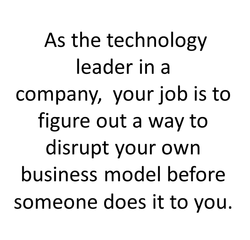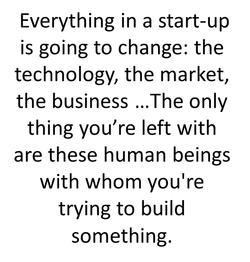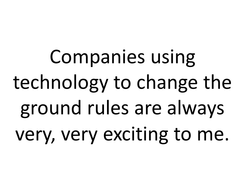
On getting started as an engineer:

Arati: Yes, although there are more now. At the time, there were a couple of other women in my bachelor’s class at Texas Tech. At Cal Tech, which is a pretty small place, I was the first woman to get a Ph.D. in applied physics.
Jill: What led to your interest in electrical engineering?
Arati: I was the classic first generation immigrant kid. My mom would literally start every sentence with “when you get a Ph.D.”, and it wasn’t a joke, but I was fine with that. Although I was good in a variety of subjects, I found math and technical pursuits to be more fun. However, halfway through graduate school I found that I wasn’t really happy with doing very narrow research, and I wondered if I should finish my graduate program, or stop and do something else. Then a friend of mine said, “a Ph.D. is a union card to do research and a calling card to do anything else you want,” so I finished the program, and am glad I did.
On working across the private and public sectors:

Arati: Now I am at a point in my career where half of my professional life has been in Washington and half has been in Silicon Valley. The thread that connects the two is a passion for technology and the impact that it has. Of course, there are a lot of different ways to drive and pursue a deep interest in technology. It’s so satisfying to be directly involved with technologies driven through business, and that’s the reason I came to Silicon Valley. I’ve loved that piece of it. On the other hand, I loved the ability to really think long term about the high-level impact technology can have, which is more of what I got from my Washington life.
The difference between pursuing technological advancement through the public sector and the private sector is the time horizon. I’ve heard what people in Washington say about corporate America and I’ve heard what people in corporate America or in the entrepreneurial community say about Washington. One of the things we use to say when we were running government R&D programs was that we really have to make longer term research investments. Then I moved to a publicly traded company and it turns out you can’t even think about next quarter, because you’re so focused on this quarter. It was a really interesting lesson for me to learn how severely research investment is affected by business pressures that may have nothing to do with the actual research. This meant we had to pay attention to what financial analysts said.
As the technology leader in a company, your job is to figure out a way to disrupt your own business model before someone does it to you. Your job is to figure out new directions for your company to go that will create growth. But analysts go crazy when you want to do something new, because they have your company in a specific category and question why you want to change. The answer, or course, is If we don't change, we will die.
On life as a Silicon Valley VC:

Jill: When you got your sea legs as a venture capital investor, what kind of companies appealed to you most?
Arati: Companies using technology to change the ground rules are always very, very exciting to me. However, it amazed me to really internalize how important the people at young technology companies are.
When I came in the door, everyone into the venture capital world at US Venture Partners, everyone in venture—especially early stage venture—said the people are what really matter. I heard that, and thought that made sense to me and was consistent with all my life experience. As I got more experience working with young companies, I came to understand how all the stresses that happen in start-ups reveal people’s inner characteristics— who they really are as human beings. Very quickly, I realized that this is not an intellectual thing. You really feel in your heart how important these human relationships are when you’re trying to build these companies against all odds. Everything in a start-up is going to change, the technology is going to change, the market for sure is going to change, the business model is going to have to evolve, and something is going to happen that you had no way to predict. The only thing you’re left with are these human beings with whom you're trying to build something. I left the venture world with a much deeper appreciation of having the right people in a young company.
On creating engineering leaders:

Arati: First and foremost I really hate to generalize; I think we are all victims of generalizations that turn into stereotypes, and I don’t like to go down that path. The thing that I find that makes technical people super effective is having context for what they're developing and not getting lost in the weeds. I’ve seen men who are very good at that but I’ve also frequently seen women who are particularly good at going deep into the details and also being able to pull up and see the big picture—see how everything knits together. That’s hugely valuable.
Jill: How do you think young people with deep technical training can acquire that skill?
Arati: As a member of the Engineering Advisory Committee of UC Berkeley, I see that something that people are actively talking about in engineering education.
To be a great researcher, you absolutely have to know how to go deep into the technology and build up at the fine grain level. To educate engineering leaders or even just effective engineers who are going to function at organizations and be great contributors, they also need to have greater context for their research. I think universities are struggling with how they can provide more of that, without losing the technical detail focus. There are engineers who really are really fantastic at the details and are never going to come up out of that to see the big picture; they’re going work on their projects, and that’s great. But the ones who have an aptitude and an interest in linking those details to the big picture are the ones who end up becoming engineering leaders, VPs of engineering, founders of companies—they might become technical visionaries. You really need that dynamic range if you’re going to do all those other roles.
On Startupism, raising girls, and the next generation of entrepreneurs:

Arati: There are students in universities who are driven to invent something, to start a company; that’s just what they want to do. But for every Zuckerberg there are thousands who are not going to do that. I think that kind of success is great if that happens. Alternatively, if we give students in technical fields more context in their education, then whether they work in established companies or in start-ups, they’re just going to have a different frame for looking at the world. I think that will make them more effective when they do decide to start a company 2 or 3 years later.
However, who knows? When there are whole new industries that are being defined and shaped by radical new business models, and deep technology is not required because the deep technology is just widely available infrastructure—think the already-developed Internet infrastructure and the new business model put forth by social media— it creates an environment that lends itself to that kind of entrepreneurship. But, if you’re going to build something that is about really defining differentiated technology, you actually don’t build that in your college dorm room. There’s just more technical meat to it. Generalizing, I think what’s happening with social media doesn't easily extend to other kinds of enterprises.
Jill: Do you have any advice to offer to women who want to take that step to start their own business?
Arati: I would say the same thing to a woman as I would say to a man that wants to start a company. It’s the same thing regardless of gender. These are huge life choices filled with the need to understand the trade-offs. In addition to the business questions of your particular enterprise, there are the human being questions, the life questions. Arguably when you’re young and you don’t have a mortgage and don’t have a person who is depending on you for stability or income, that’s a good time to take a flyer — but you do want to know as much as possible what you’re getting into. You'll want to know what the upside is (in addition to the exhilaration and learning that can come from starting a new business) as well as the downside. Maybe it’s going to be you don’t make it to your cousin's wedding, or maybe you’re not going to be a part of your family for awhile because you become consumed with your new company. Anyone considering starting a new business must consider the trade-offs and the life choices; perhaps more so than the new technology.
Jill: Do you think that the trade-offs that one has to make to start a company are different from that path that you took?
Arati: I think those questions apply to every fork in the road. These are the hardest, most interesting life decisions that are true about everything you do. A start-up is an extreme example of that, because you know it’s going to eat you alive if you’re going to do it well and the risks are huge, but if you’re truly an entrepreneur there’s no exhilaration like that particular kind.
Jill: Do you think your girls look at their futures as if anything is possible, or do you think they feel renewed pressure to pick more traditionally acceptable female professional roles?
Arati: My girls have been raised to believe that it’s important to make a contribution to the world. That may involve technical careers or very different careers, as I strongly believe there are many ways to contribute. While technology paths are completely accessible to them, they have to feel their own ways through their futures.
 RSS Feed
RSS Feed
